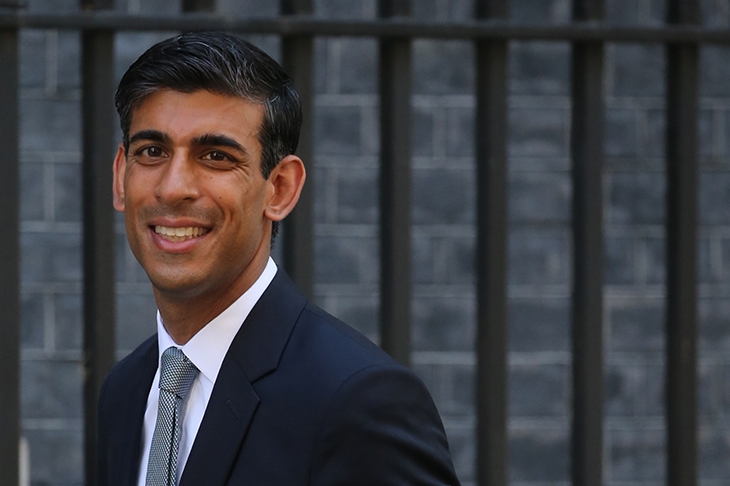‘Turbocharging’: sounds exciting, doesn’t it? Two weeks ago, I noted that our incoming PM had deployed this power-word — with its subliminal reminder of his pedal-to-the-metal reputation as the former motoring correspondent of GQ — to describe what ‘free ports’ would do to regional economies. Since then, it has clearly been scrawled on Dominic Cummings’s Downing Street whiteboard: Foreign Secretary Dominic Raab and Chief Secretary to the Treasury Rishi Sunak were also bandying it around this week. In one sense it just seems to mean ‘energising’; in another, I suspect it’s a synonym for something no free-market cheerleader for the new cabinet would ever admit is a good thing: a desperate burst of debt-fuelled Keynesian public spending designed to push the economy through a no-deal crisis.
Hence that £300 million ‘pledge’ for Scotland, Wales and Northern Ireland — and sudden enthusiasm for the Manchester-to-Leeds rail route. This is a bite-sized £3 billion proposition that’s easy to promise even if the full £39 billion Northern Powerhouse rail scheme linking Liverpool to Hull and points north, first mentioned five years ago, never leaves the drawing board. A 45-mile Manchester-Leeds upgrade doesn’t need a decades-long timetable: between Chinese cities, it would be done in six months. And it really would energise a regional economy long held back by dreadful Transpennine transport links. So however many other promises are abandoned or denied in the coming autumn of chaos, let’s hope this one happens. Who knows, it might be a short-lived Johnson government’s greatest legacy.
Man to watch
Rishi Sunak, incidentally, is my tip for fast promotion on the new front bench. In my observation, the MP for Richmond is more engaging and more articulate than his Treasury boss, Chancellor Sajid Javid. Whereas Javid’s vaunted experience with Deutsche Bank was in areas of securities trading that the troubled German bank surely regrets having ever touched, Sunak’s background at Goldman Sachs and later as an investor involved working with entrepreneurs in Silicon Valley and Bangalore as well as the UK. Then again, Javid has his son-of-a-bus-driver back-story whereas doctor’s son Sunak has the disadvantage of being a Wykehamist: but I’d still say the former is overpromoted while the latter has a big future.
Conn trick
Iain Conn’s destiny would have been to run BP if the 2010 Deepwater Horizon disaster had not made it expedient for his then BP boss Tony Hayward to be replaced by an American, Bob Dudley. So Conn moved in 2014 to be chief executive of Centrica, parent of British Gas — where his tenure has seen the share price plunge by three-quarters as customers stampeded elsewhere. Conn never-theless collected a 44 per cent pay rise last year and now says it’s ‘a natural time’ for him to retire. ‘Hear hear,’ his shareholders chorus — but boardroom cronyism being what it is, I bet he’ll have bagged a FTSE chairmanship by Christmas.
Tobacco chief
Sir Pat Sheehy, the former British American Tobacco (BAT) chief who has died aged 88, is remembered at The Spectator as a member of the board assembled by our then chairman Algy Cluff under the proprietorship of Conrad Black: other members included Norman Tebbit, Lord King of British Airways, and my predecessor Christopher Fildes. The latter recalls that when the magazine broke into profit in the early 1990s, there was excited chatter as to how the loot might be spent — until Sheehy gruffly pointed out that any surplus was merely a repayment towards several decades’ accumulated deficit.
In his memoirs, Cluff recalls Sheehy as ‘almost a caricature of capitalism, florid, portly and intimidating’ — but with ‘the kindest of hearts’, which I remember from my own encounters. Pat was admired for having fought off Jimmy Goldsmith, Kerry Packer and Jacob Rothschild, who bid for BAT in 1989 with a promise to sell off the group’s non-tobacco interests, chiefly in insurance, into which Sheehy had diversified as health fears curtailed western smoking habits. But arguably it was the raiders who were right, in an amoral sense: after Sheehy, when BAT refocused on selling fags in emerging markets, its shares soared. If you bought them on the day he retired in 1995, you would have multiplied your money some 15 times by mid-2017, while the FTSE100 index did little more than double.
Though the shares have fallen since then, pension funds that shunned ‘sin stocks’ such as BAT (and its rivals Imperial, Philip Morris and Altria, as well as the gambling and arms sectors) are left pondering as they struggle to meet their obligations to pensioners. The California Public Employees’ Retirement System, known as Calpers, has an unfunded hole equivalent to 30 per cent of its pension liabilities and reckons to have sacrificed $3.6 billion in investment profits since it got out of tobacco in 2001; hence some members of its board have bravely argued for a reversal of the policy. Ironically, one fund manager whose 20-year punt on BAT shares helped make his performance look stellar in better days was none other than today’s market pariah Neil Woodford.
Peak pilfering
Several of you emailed anecdotal indications of ‘peak gin’, about which I wrote last week. And one reader told me he knew it was time to sell his high-performing Fever-Tree shares when British Airways stopped offering the premium tonic water in its first-class lounges: ‘I could no longer indulge in my usual practice of loading up my carry-on bag… I always felt that “liberating” not less than 16 cans per trip was a small revenge on BA for the way their management treats customers.’ Not so much a sell signal, perhaps: more an anti-pilfering precaution?







Comments